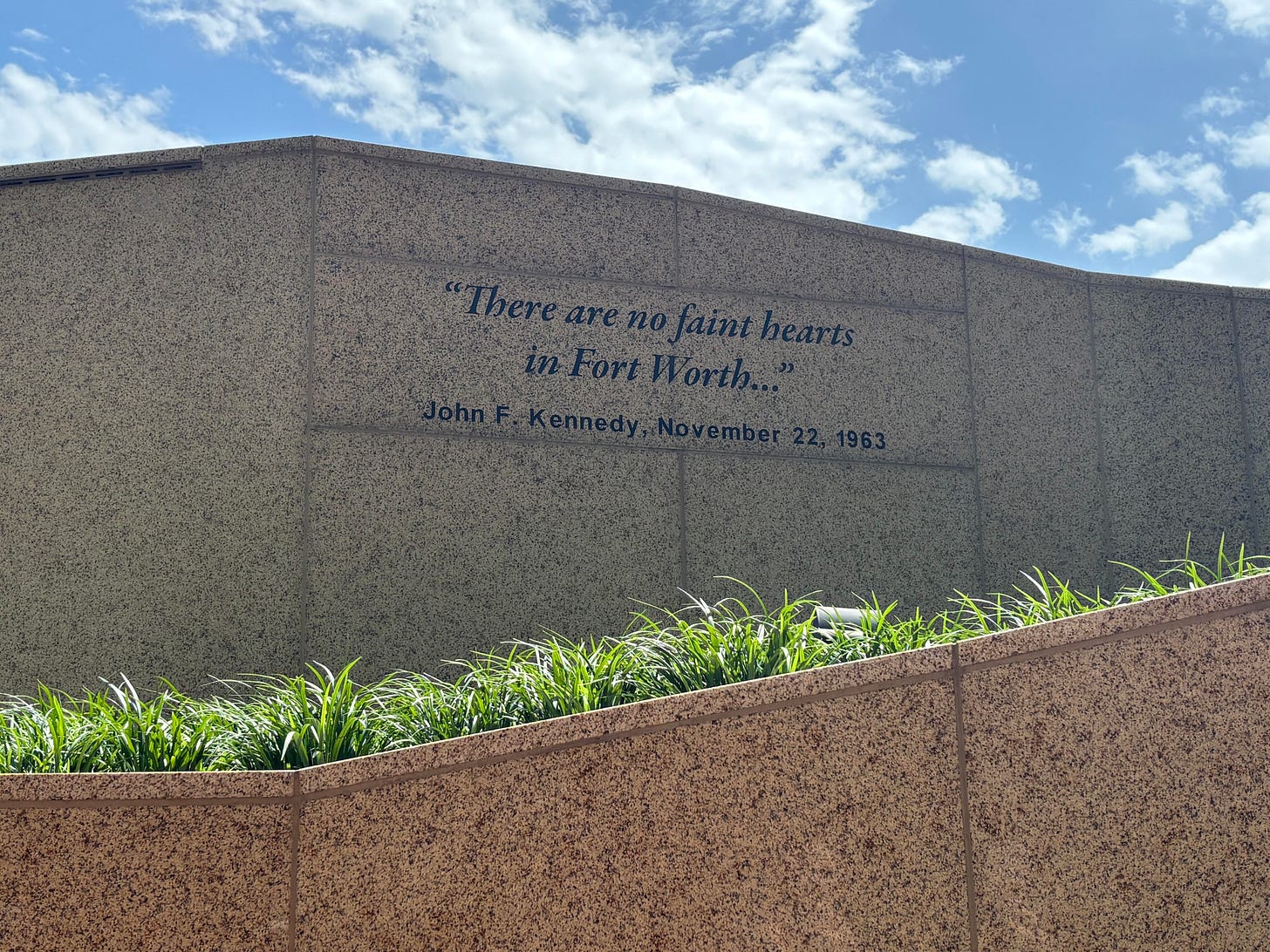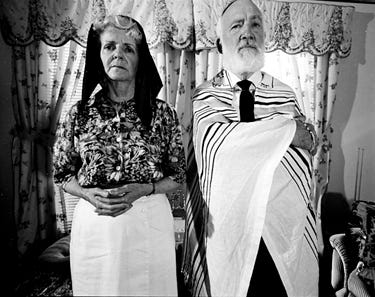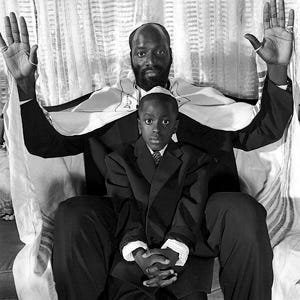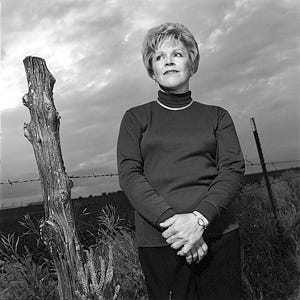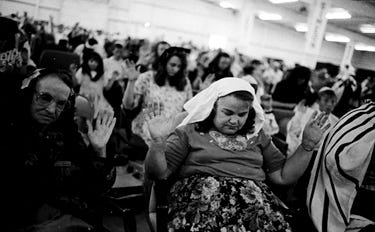6/7/2025
The Hilton Hotel at the corner of 8th and Main Street in downtown Fort Worth is the former Texas Hotel. It was there that John F Kennedy stayed the night of November 21 1963—the eve of his assassination on Elm Street in nearby Dallas. A friend had just visited the Grassy Knoll; she told me how disappointed she was that the location from where the CIA gunman might have fired the killing shots had been unceremoniously reduced to a parking lot. The Hilton, by contrast, had been repurposed into a shrine that distilled the traumatic subterfuge of the presidential slaying into pure kitsch Americana. Across the street, a bronze JFK statue before a gentle, stone waterfall. “There are no faint hearts in Forth Worth” is etched into the surface. That’s from Kennedy’s final speech.
I watched the speech on YouTube that evening. It’s uninspiring, beyond that line—the bulk of Kennedy’s words were a protracted ode to the military industrial complex, the slew of defense contractors and weapons makers and aviation manufacturers that constitute the industrial belt that binds Dallas and Fort Worth together. It’s a curious thing, a perfunctory praise of the very economic interests that probably staged-managed the whole affair, moved Lee Harvey like a little stick figure across a vast tableau, positioned shooters and crooked cops and mobster fall guys and Russian emigres into their critical positions, arranged the delivery of the rifle(s), loaded them with bullets, pulled the trigger.
After that morning speech Kennedy and Jackie left the Texas Hotel, rode in the protected motorcade to the airport, and took a ten minute flight to Dallas. They disembarked, climbed back into the open-top Cadillac, and made their way in the direction of the Texas School Book Depository Building.
The departure is recorded on a little painting that the Hilton saw fit to place above the toilet in every bathroom. Underneath the painting it reads in part: “…after a speech in the hotel’s ballroom and a press conference directly into front of the hotel, the President’s motorcade departed, taking with it the final moments of a more innocent America”.
I walk down a long hallway. The man walking with me remarks that the hotel’s corridors resemble the labyrinthine hotel of The Shining. Do you think we’ll see doubled ghosts of JFK at the end of this, he asks.
6/8/2025
Can’t sleep, sitting outside the hotel smoking a cigarette. Lightning is flashing behind the skyscrapers and small spits of rain fall, piercing the humid air. A man walks up to me, sits down. I’m a LaFayette, he says. I came on a LaFaytte ship. Wow, I said. That’s interesting. Can I bum a cigarette? He asks. This is my last night on earth. The air is heavy, stale, enveloping. Thunder churning in the distance. Why is this your last night? I ask, handing him a cig and my lighter. It’s the end, he says. He lights his smoke and hands the lighter back. I’m going to die, soldier. I’m really sorry to hear that. Why are you going to die. He shrugs. Well, I say. I think I need to go. He looks at me. Will you pray for me ? I’ll pray for you, I tell him. Thank you he says. Do you need another cigarette? I’ll give you this lighter. I have another one. You can have them for the road. I don’t know why I phrased it that way and I hand both to him. He smiles. Do you know funeral rites in Haiti? He asks, lighting the second cigarette. Tobacco smoke burned over the dead body. He waves the cigarette in the air, slowly and deliberately as if tracing the outline of a sigil. White swirls twisting in the air. Ok, I tell him. I really have to go inside now. I walk away. He’s still sitting at the bench. Back in the lobby of the hotel, sneakers squeaking on the marble floor. Crisp coldness of air conditioning. Soft voices, echoes of laughter from somewhere else. I think about New Orleans in late summer of 2023. I left two cigarettes on a voodoo shrine.
6/12/2025
If you cruise out from Fort Worth on Interstate 20, moving southwest through a scattered handful of towns with names like Brazo, Santos, Strawn, and Ranger, you’ll arrive in Eula, Texas. It’s an unincorporated community, population: 124. For all intents and purposes Eula is a ghost-town. It’s also home to a peculiar religious sect, one swept along with the doomsday fervor that typifies remote churches and the charismatic self-taught preachers that preside over them. The House of Yahweh (HOY), led by Yisrayl Hawkins until his death in 2021.
HOY is pure late Americana. The continental United States—this disjointed and fractured ‘nation swarming with nations’—has always been the home to countless divergent religious movements, cults, compounds, experiments in communal living, unique distillations of homegrown esoterica and Biblical prophecy. From the earliest days (that subterranean history of Rosicurcians and anti-Masons and upstate New York outbreaks spiritualism) down through the present, these movements retool and reassert themselves with the dominant means of their time. At their peak in the 1990s, HOY promoted itself with mail order campaigns. It dominated late-night public access television across Texas. It brought in members far and wide in rapt anticipation of the coming apocalypse and the cult drove its membership into forms of polygamy that would make the most radical Mormons blush.
Yisrayl Hawkins was born—appropriately enough—as Buffalo Bill Hawkins. As with his cult, his own story is late Americana in concentrated form. Buffalo Bill spent time as a police officer in nearby Abilene, and he made a name for himself as the singer in a rockabilly band—Buffalo Bill and His Whippoorwills. He also worked as the band’s manager; according to one former bandmate, Bill “always kept the biggest part of” their earnings “for himself”.
In the late 1960s Bill’s brother, J.G. Hawkins, moved to Israel. He spent years there imbibing in biblical archaeology. The holy spirit blessed him with soaring visions. He began to change his name to Jacob (or, alternatively, ‘Yaagob’). He returned from Israel in 1975 and launched a small church in Odessa, Texas. Bill retired from the police, enrolled himself in a public speaking course, and joined his brother at the pulpit. They preached an idiosyncratic blend of doctrines: the fire and brimstone of the Book of Revelations filtered through the harsh sun and dirt of the American southwest and a strict adherence to the binding strictures of Old Testament law. The experiment proved, however, to be short-lived. Yaagob Hawkins told the congregation that God’s true name was Elohim. Buffalo Bill disagreed: the sacred name of God was actually Yahweh. The two split and Bill launched his own church. It operated from his double wide trailer park home—The House of Yahweh was born.
Between 1980 and 1990 the church grew rapidly. Buffalo Bill—now going by Yisrayl—collected heavy tithes from his followers, which allowed him to buy the 44 acres of land adjacent to his trailer park. The congregation was invited to purchase trailers of their own and park them on the land. The company that sold these mobile homes was, unsurprisingly, owned by Yisrayl. As the community in Eula grew, so did the prophecies. Down through the years various dates were fixed for when the Tribulation would ignite: 2000, 2002, 2006, 2008. Each year slipped by without the apocalyptic event arriving, and each year a reinterpretation of the Bible was issued. The congregation never wavered. This dynamic is fairly common: when prophecy fails, true believers tend to double down. The event is still imminent, it’s just our interpretation that was wrong.
The House of Yahweh once attracted the eye of Mary Ellen Mark, the famed photojournalist. She traveled to Eula, spent time with the congregation, studied the church’s doctrine, and tried in vain to photograph Yisrayl Hawkins. She was never given direct access to the prophet. “He would never allow me to photograph him”, Mark later recounted. “I did everything I could to convince him “But I couldn't. I was told he wasn't even on the premises. Which was weird: I swear I looked backstage once during a service I attended and saw Yisrayl Hawkins looking at me. Then he moved on. If it wasn't him, it was his spirit”.
Even if she wasn’t allowed to record Yisrayl, the photos she did come away from Eula with were fascinating. Here are a few of them:


